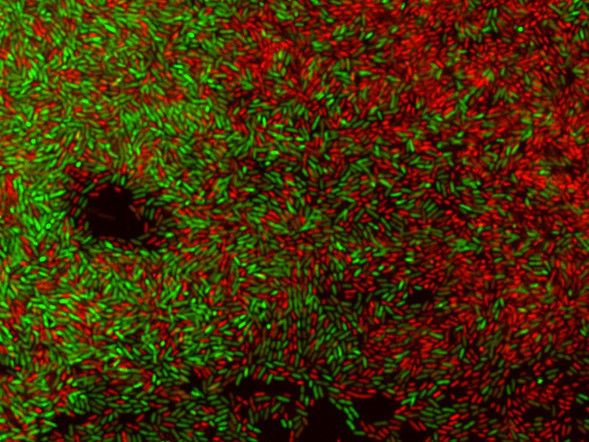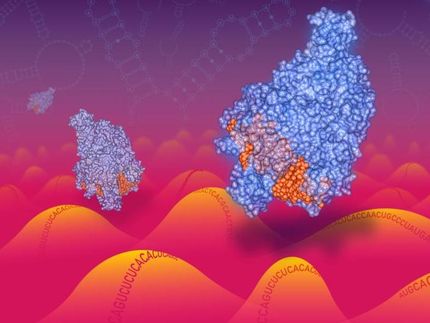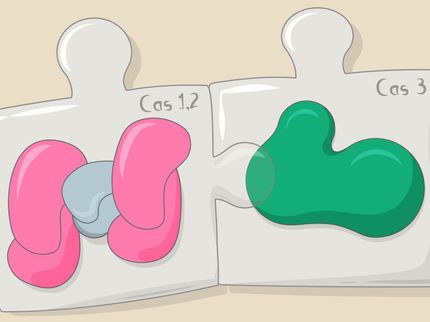Listeria protein provides a CRISPR 'kill switch'
The protein AcrVIA1 instantly stopped the CRISPR editing process
A single protein derived from a common strain of bacteria found in the soil will offer scientists a more precise way to edit RNA.

Philippedelavie/ Pixabay
The protein, called AcrVIA1, can halt the CRISPR-Cas13 editing process, according to new research from Cornell, Rockefeller University and the Memorial Sloan Kettering Cancer Center published in the journal Science.
"We're expanding our scientific toolbox to effectively use a CRISPR without causing side effects," said co-author Martin Wiedmann, Ph.D. '97, the Gellert Family Professor in Food Safety and director of Cornell's Food Safety Laboratory and Milk Quality Improvement Program. "Thanks to this bacterium, we're getting a chance to turn off and on our ability to make changes to RNA."
CRISPR, or the clustered regularly interspaced short palindromic repeats, is a laboratory mechanism that can act like microscopic scissors and precisely edit the genes contained in DNA. Among the half-dozen types of CRISPRs in use today, CRISPR-Cas13 can edit RNA, which until now had lacked a brake in the editing process.
Since SARS-CoV-2, the coronavirus that causes the COVID-19 disease, is an RNA virus, this new editing accessory may be useful to coronavirus researchers, the scientists said.
Lead author Alex Meeske, postdoctoral researcher in the lab of senior author Luciano Marraffini, professor at Rockefeller University, had suspected that a protein (bacteriophage) housed in Listeria could be useful for RNA editing.
At the start of this study, Meeske reached out to Wiedmann, a food safety expert, to obtain genetic bacterial samples from his food pathogen collection. Doctoral candidate in the Wiedmann laboratory Jingqiu Liao narrowed down the prospects from about 1,500 bacterial candidates to 62 strains.
The Wiedmann lab transferred those samples to Rockefeller, where intern Alice Cassel sequenced the 62 strains and isolated 20 candidate proteins.
One strain stood out: Listeria seeligeri, a harmless bacteria found everywhere in the soil. Unlike its fierce cousin - the foodborne pathogen L. monocytogenes - it does not cause human disease.
The Rockefeller scientists found that the protein AcrVIA1 - derived from L. seeligeri - instantly stopped the CRISPR editing process. "AcrVIA1 can be very useful in controlling application of Cas13. Anything that the Cas13 edits, this anti-CRISPR protein can shut off," Meeske said. "It's a 'kill switch' you can use during the CRISPR editing process, and it has become an additional tool we have at our disposal."
Wiedmann explained that scientists can now work on RNA problems with more exacting means. "This tool gives us more precision," he said.
Most read news
Organizations
Other news from the department science

Get the life science industry in your inbox
By submitting this form you agree that LUMITOS AG will send you the newsletter(s) selected above by email. Your data will not be passed on to third parties. Your data will be stored and processed in accordance with our data protection regulations. LUMITOS may contact you by email for the purpose of advertising or market and opinion surveys. You can revoke your consent at any time without giving reasons to LUMITOS AG, Ernst-Augustin-Str. 2, 12489 Berlin, Germany or by e-mail at revoke@lumitos.com with effect for the future. In addition, each email contains a link to unsubscribe from the corresponding newsletter.
Most read news
More news from our other portals
Last viewed contents
FDA advisory committee recommends approval of Sanofi treatment for adults with type 2 diabetes
Benoît Battistelli takes over as President of the European Patent Office
New mechanism of pancreatic cancer discovered
Unconventional natural gas wells associated with migraine, fatigue
Pieris Initiates Phase I Clinical Trial for Lead Anticalin Compound - Anti-VEGF PRS-050 is first Anticalin tested in humans
New combination therapy looks promising against ulcer bacteria
European Medicines Agency advises on compassionate use of daclatasvir - Opinion concerns use in combination with sofosbuvir in patients with chronic hepatitis C in urgent need of therapy to prevent progression of liver disease
Novartis completes shipment of US supply of Fluvirin seasonal influenza vaccine
A Change of Culture for Healthcare
Medicyte GmbH Benefits From Multi-Million Euro EU Grant VascuBone
Pneumonoultramicroscopicsilicovolcanoconiosis























































